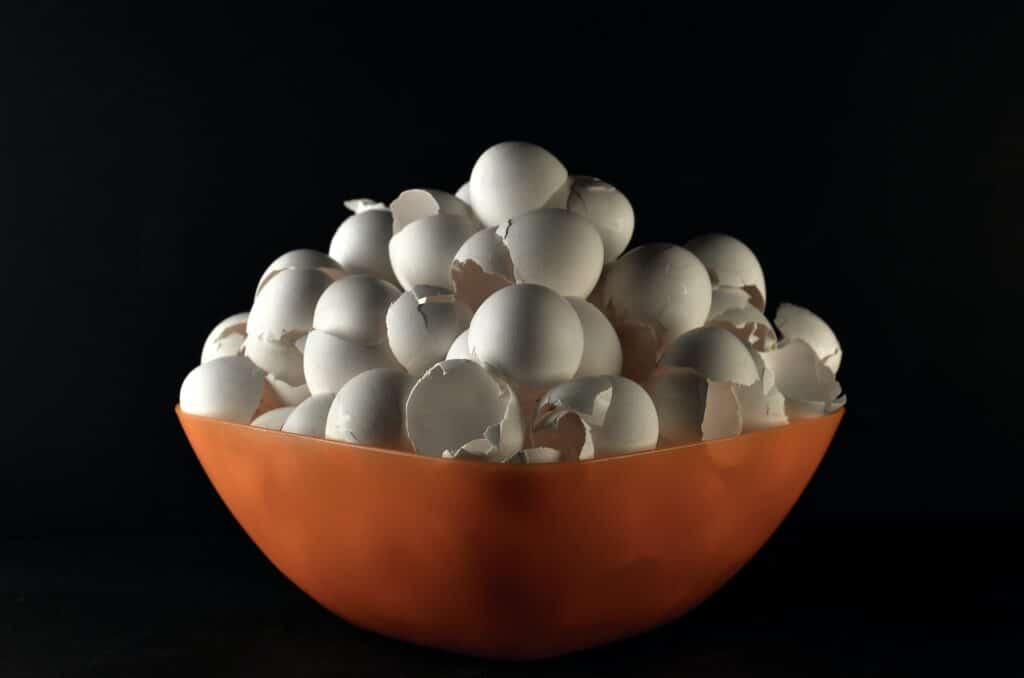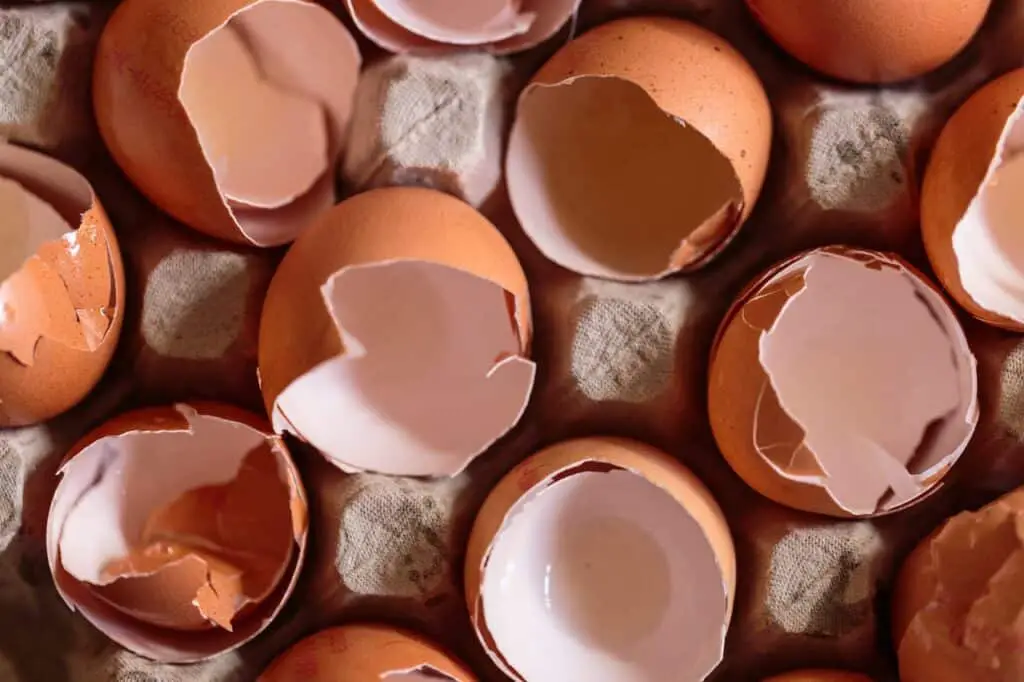Do you have a dog that likes to eat everything? Some foods can be bad for dogs, and you might wonder if even simple things like eggshells are harmful.
You probably know that dogs can eat eggs, which are healthy for them. But, can dogs eat egg shells? The quick answer is yes, they’re safe, but there are a few important things to know. We’ll share all you need to understand about dogs and eggshells.

Table of Contents
Can dogs eat egg shells?
If your dog finds a bird’s nest outside, he might eat the eggs and the shell too. Your dog’s strong jaws and sharp teeth can easily break the shell.
But, the shell won’t fully break down in your dog’s stomach. You’ll notice bits of it later because your dog can’t completely digest the tough shell.
So, while dogs can eat egg shells, it’s important to feed them in a way that helps the shells get digested.
What are egg shells made of?
Eggshells are mostly made of calcium carbonate (CaCO3), a mineral that is crucial for building bones and teeth, constituting about 94-97% of the total shell mass. This natural compound is found in many living things.
Apart from calcium carbonate, eggshells also contain small amounts of other minerals like magnesium, phosphorus, sodium, and potassium.
The outer layer called the cuticle, is made up of proteins and polysaccharides. It acts as a shield, protecting the egg from bacteria and preventing water loss through the shell’s pores.
The inner layer, or the shell, consists of two thin membranes primarily made of protein fibers. These membranes safeguard the egg’s white and yolk from contamination and keep them secure within the egg.

Benefits of eggshells?
Eggshells have essential minerals that are good for dogs and can be beneficial for their health.
Calcium
Dogs, like us, need calcium for strong bones, teeth, and many other vital functions in their bodies. While regular dog food usually provides enough calcium, some health issues can make their calcium levels too low. Kidney failure, hyperparathyroidism, and hyperparathyroidism are conditions that might cause this.
If your dog lacks calcium, a supplement may help, and eggshells are a good and affordable source. However, always consult your vet before giving any supplements to your dog.
Phosphor
Calcium and phosphorus are minerals that work together to keep bones and teeth strong. Luckily, eggshells have a good amount of both. Phosphorus is also important for things like blood clotting, muscle growth, and your dog’s nervous system function, along with calcium.
Magnesium
Eggshells have a lot of magnesium, an important mineral for your dog’s health. Dogs require magnesium to absorb calcium properly. Just like calcium and phosphorus, magnesium plays a crucial role in building strong muscles and bones.

How prepare eggshells for dogs
Preparing eggshells for your dog:
- Drying the eggshells: Drying is crucial to kill bacteria and make eggshells last longer. Spread them on a baking sheet or in a dish, and let them air-dry or use the oven at a low temperature (around 100°C) for 10-15 minutes.
- Grinding the eggshells: After drying, grind the eggshells into a fine powder for better digestion. You can use a mortar and pestle or a coffee grinder. Fine powder is easier for dogs to absorb.
- Storing the eggshell powder: Keep the powdered eggshells in an airtight container to protect them from moisture and contamination. If stored in a cool, dry place, it can last for several months.
- Mixing with other foods: Create a balanced meal for your dog by adding eggshell powder to ingredients like meat, vegetables, and fish. Adjust the meals based on your dog’s nutritional needs.
Note: Depending on your dog’s preferences and needs, some experts suggest considering other calcium sources like bone meal or calcium supplements.
How to feed your dog eggshells?
Making eggshells safe for your dog:
Dogs are less likely to get sick from salmonella, but it’s better to use eggshells from boiled eggs for safety. Boiled eggshells are more fragile, making them easier to turn into powder.
The best way to give eggshells to your dog is in powder form because it mixes well with their food. This helps their digestive system absorb the minerals from the eggshells.
Here are two ways to prepare eggshells:
- From Boiled Eggs:
- Boil some eggs, peel them, and save the shells.
- Chop the shells in a food processor or crush them in a plastic bag with a rolling pin.
- Baking Method (From Modern Dog Magazine):
- Preheat your oven to 150 degrees Celsius.
- Spread eggshells on a baking sheet evenly.
- Bake for 5 to 7 minutes until they’re white or light brown (not dark).
- Let them cool, then grind them into powder using a coffee grinder or food processor.
- Store the powder in an airtight container at room temperature for up to two months.
Feeding guide:
- Mix ¾ teaspoon of powdered eggshells with every 4 ounces of your dog’s food.

Conclusion: Can dogs eat eggshells?
Dogs can enjoy eggshells, but for the best health benefits, you must prepare them right. Dogs can’t digest whole shells, so it’s important to give them in powder form.
Eggshells are rich in three essential minerals: calcium, phosphorus, and magnesium. These minerals help in building strong bones, and teeth, and contribute to your dog’s overall health.
If your dog has thyroid issues or a condition affecting calcium levels, talk to your vet before giving them eggshells. Too much calcium can be harmful to certain dogs.
If you are interested, read also if dogs can eat Figs , Butternut Squash, or Pretzels.